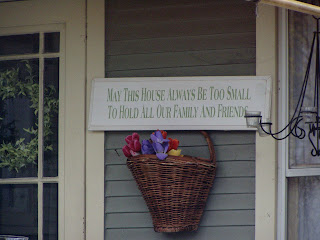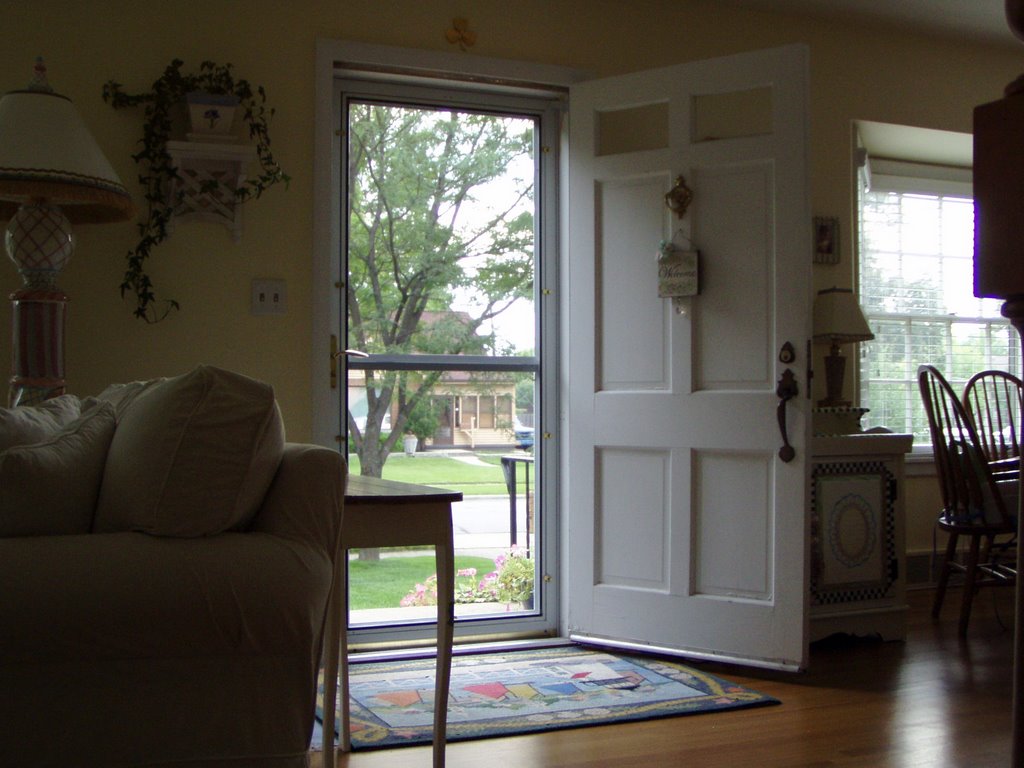Today's Oprah is about autism. Maybe you will have a chance to watch it. I heard recently that the show was looking for Chicago area families to participate by sharing their story about living with autism. We didn't make it on to the show, but I would like to share my application with you. I think this explains a lot about me, my family, and "life in a much loved 1950s cape". It's been something that I have wanted to share with you for awhile now, but I didn't know how to. This seemed like the best way to do it.
* * * *
Dear Oprah,
My husband and I have a 5 yr-old son who was diagnosed with autism shortly after his 3rd birthday. He is our oldest child. We also have a 2 1/2 yr-old son who is a typically developing boy.
Bobby is our son with autism. He is a beautiful, fun-loving, sweet child, who was the perfect baby. From the time he was born until well into his toddler hood, we thought his quiet attention to details and his preference for listening and observing were personality characteristics consistent with being a first born child. It was not until the middle of my second pregnancy that my husband Rob and I started to notice that Bobby was not interested in things that other children his age seemed to be: communicating with peers, potty training, and extensive communication with his parents. He was a friendly baby who would smile at us, liked to be hugged and touched, loved to listen to music, look at number and letter puzzles, and run...yet he did not spend much time interacting with us. When he spoke he repeated what we said more than anything. It was as if he enjoyed us from a distance. Our pediatrician at the time told us that Bobby was just shy and needed to be around children more.
After our second son was born, we felt that we needed to pursue our continuing doubts about Bobby's development. Fortunately, we found a pediatrician who guided us down an aggressive path of having Bobby's development evaluated by professionals. We signed him up for an evaluation with the local school district as well as with a private center in town. The process of having Bobby evaluated by both sources lasted for a few months. By the end we had read a lot about developmental delay. Still, it was heart breaking to hear our fears confirmed when a doctor told us that Bobby had autism and that he needed extensive therapy.
Ever since that day, we have devoted our lives to treating and conquering Bobby's autism. We are fortunate to live near the Little Friends Center for Autism, where we have found tremendous resources and support. We are also fortunate to live in a school district that recognizes and provides for children on the autism spectrum. More than anything, we are fortunate for the love and support that we give each other, and for the love and support that we receive from our parents and families.
Overcoming the challenges that autism presents is not an easy task for Bobby. While other children his age are busy playing, Bobby is working. For the past 2 years, Bobby has attended a preschool class through the public school system 5 days a week, where professionals provide speech, occupational therapy, and social skills therapy. He receives ABA therapy 5-6 days a week at home, for 2-3 hours each session. He attends an extra hour of both speech and OT during the week away from home as well. From the moment he wakes up in the morning until he goes to sleep at night, we are constantly working with him on learning something: how to dress himself, how to feed himself, how to perform other self-care tasks that other children know intuitively, how to speak to his brother, how to ask for something using the right words, how to express his needs verbally by using the correct pronouns, how to play with a friend, how to figure out the world. Learning the ins and outs of potty training took about 2 years of constant practice, and has been his biggest accomplishment to date. It is not an exaggeration to say that Bobby’s schedule as a 5 yr-old is busier, more rigorous, and more demanding than some adults we know.
And yet, we press on and challenge him because we see progress every day. Every day we see his potential increasing. His progress is slow, but it’s steady. Bobby has made obvious strides in all the areas that he works in, because he’s got will and determination, love and support around him, and the tools within reach to do it. He can construct full sentences now. He can sit and attend to a teacher at a table and perform multiple tasks when asked. He can draw a circle, square, and sign his name. He can take turns (albeit, sometimes reluctantly) with his younger brother when they both want the same toy. The tasks are not easy, but they become more familiar and routine the more he performs them. In the area of academics, such as (pre)reading and (pre) math skills, Bobby is performing at a level that is superior to other children his age. His biggest challenge, perhaps the area that is his biggest deficit, is maneuvering social situations with a group of people. Next year after kindergarten he will attend a half day social sills program to improve his peer to peer relations. We are confident that Bobby will make the strides in this area that he has in the other areas.
Living with autism is not easy. My husband and I are lucky, because we are on the “same page” when it comes to seeing Bobby’s strengths and weaknesses. Neither one of us is in denial about his condition and the challenges he faces. We get strength from that because we have the same hopes and dreams for him. But from time to time, we still struggle to come to terms with the realities that autism presents. We wish that he could talk to us beyond telling us his wants and needs and observations of what he sees around us. We wish that he could tell us how he feels, what he wonders, what he believes. We know there is a little boy inside that body who has hopes and dreams of his own. We know he probably feels different from other children when he’s around them, and he probably doesn’t know why he is different. We know he has a vivid imagination where he spends most of his time visiting the characters he has met in books or movies. We wish that he could spend more of his time visiting us.
Treating Bobby’s autism has completely changed our lives in terms of how we live on a day-to-day basis. I have chosen to be a stay-at-home mom, but given Bobby’s schedule and his needs, I could not return to work full-time even if I wanted to, because I need to manage his constantly changing and intricate schedule. Meeting other moms during the day is almost impossible because we generally do not have time for play dates or other kid/mom activities. When I am around other moms who have typically developing children, I sometimes find it hard to relate to their daily talk and discussion of what life in their households is like. It can be isolating to experience something that you think no one really understands. I have met a nice group of women who also have children with autism, but I do not see them often, probably once every 2-3 months. In order to combat the loneliness I was feeling during my days, I started a bunco group in my neighborhood. Connecting with women at night – and without kids – has been the best way for me to encourage a network of friendships with moms close by.
Treating autism has also meant staggering medical bills for us. From the evaluation process, we have been consistently fighting to pay the medical expenses generated by treating autism. Most of these expenses are not covered by insurance. It is maddening.
Another maddening aspect of autism is the mystery surrounding it. The great divide of beliefs within the autism world in terms of its origin is confusing and upsetting. No one knows where it comes from and why the number of kids being diagnosed is on the rise. Some people say it’s the vaccinations. Some people say it’s not. Also, what does a diagnosis really mean for a child like Bobby? What will his life be like? All of the professionals we work with are carefully trained to not speculate. We are optimistic but uncertain about the opportunities that Bobby will have when he is an adult. For that matter, we are uncertain about what his life will be like as he grows more into his boyhood. Will he have friends? Will he be able to converse with us, in a true back and forth manner? Will he be able to work, go to college, live on his own? While it’s true that no one knows what life brings for any one of us, it is maddening as a parent of a child with autism to not know any parameters. Every child with autism seems to be different, so it’s impossible to say how each of these children will function as an adult.
With the clock now ticking past midnight, I should not write any longer. But I am happy to share our story with you and your viewers, especially if hearing about our experience helps another family and another child in the same situation. The one thing I want to be sure you understand is that our story is one of hope. Our little boy has great challenges and is in the fight of his life to secure a “normal” life for himself in this big world. But he is on his way. Despite the struggles and battles, this is not a sad story, Oprah. Bobby is on his way, and he is going to get the best of autism and live the fullest life imaginable. We imagine great things for him.
Sincerely,
Meg
















